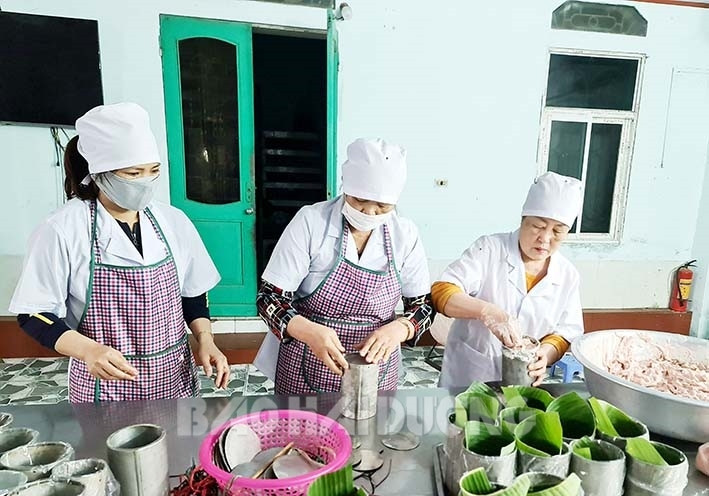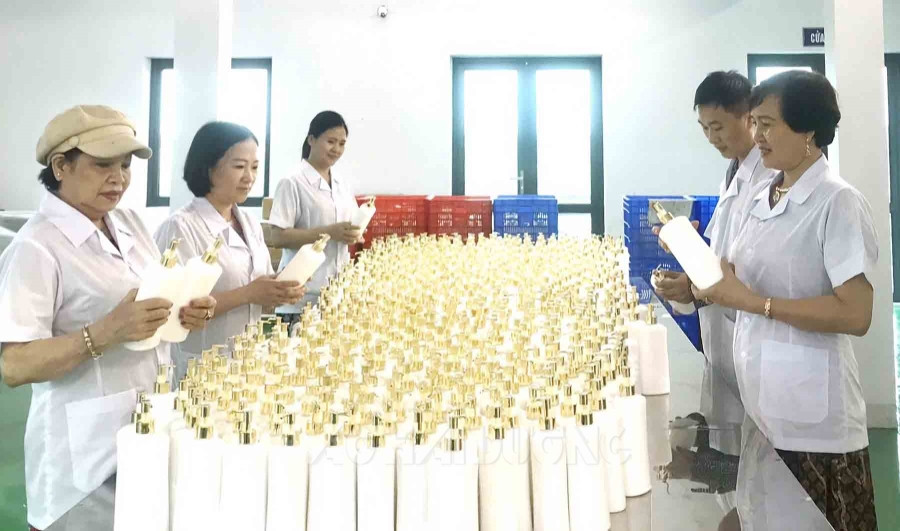The "One Commune One Product" (OCOP) program is an important rural economic development program, but many OCOP products of Hai Duong have not yet promoted their strengths.

Currently, the "One Commune One Product" (OCOP) Program of localities in Hai Duong still has many difficulties, which need to be overcome soon or else it will be wasteful and ineffective.
Not yet promoted
In 2022, GREEN ASIA Herbal Technology Joint Stock Company in Cam Thuong Ward (Hai Duong City) has 5 products that have achieved 3-star OCOP certification. These are the only pharmaceutical and cosmetic products in the province. These products are assessed to have great potential for development due to their natural origin and user-friendliness. However, so far the products have not found a good market.
Ms. Pham Thi Thuy Van, Sales Director of GREEN ASIA Herbal Technology Joint Stock Company, shared: “Although participating in many fair programs in provinces and cities, the company did not achieve the desired results. Currently, all 5 OCOP products have to stop production because they cannot compete with similar products on the market. To maintain operations, the company is forced to produce processed goods for other businesses.”
Not promoting strengths and not identifying OCOP product brands in the market is a common situation of many OCOP products today. Dong Gia jicama is also an example. As a typical agricultural product of Dong Cam commune (Kim Thanh), jicama has not been certified with 3-star OCOP until 2022. According to Mr. Nguyen Dang Bac, Director of Dong Gia Commune Agricultural Service Cooperative, the biggest difficulty is product quality management. Although a production process has been established according to VietGAP standards, due to the large number of small-scale production households, it is difficult to control the production process according to the process. Currently, Dong Cam commune has nearly 100 hectares of jicama with about 300 households participating in production. The cooperative and local authorities have promoted to the people and members of the cooperative that jicama products have been certified with OCOP, but some households are still not really interested and focused on implementing the production process. Although the province supports labels and OCOP certification, the products are still sold freely and are completely dependent on traders. Because the linkage chain has not been built, the products that have achieved OCOP certification are not different from those that have not achieved it.
The province currently has 138 OCOP products with 3 stars, 94 products with 4 stars and 2 products that are proposed for 5 stars. The number of OCOP products increases rapidly every year, but is not sustainable. Some localities are still chasing achievements, focusing on products that have been formed before, including products that do not have advantages for development, and the subjects have not proactively participated in the program. Although trade promotion activities have been implemented by many localities, they are still fragmented, lacking in uniformity, and quality management and standards are still limited...

GREEN ASIA Herbal Technology Joint Stock Company had to temporarily stop producing OCOP certified products due to unsold products. The unit switched to manufacturing and processing products of other enterprises.
Photo: Thuy Van
Must link to develop
OCOP is a key rural economic development program associated with new rural construction in the direction of promoting internal resources and added value.
Currently, many OCOP products are produced by small companies, cooperatives or household groups, so their scale and economic potential are not strong, making it difficult to invest and complete the evaluation process. There are establishments that have produced goods and sold well on the market but are not interested in completing the process for competent state management agencies to evaluate and recognize. Some entities have not yet recognized the benefits when their products are evaluated and recognized as meeting OCOP standards. Support for linkages is still limited, so many products have not yet promoted their value.
According to the Department of Rural Development, in the period of 2020-2022, the Provincial People's Committee has supported 9 billion VND for 15 OCOP product linkage models in Hai Duong. Supported products include many types of agricultural products such as cabbage, carrots, melons, guava, Bai Ruoi rice, That Hung oranges, yellow sticky rice, lychee, tapioca starch... The linkage programs have contributed to promoting production development towards large-scale concentrated goods. Thereby contributing to increasing the value of agricultural production, developing the agricultural processing industry associated with building product brands. However, the support has only focused on consulting, building linkage plans and supporting varieties, materials, packaging, labels, and has not yet implemented support for infrastructure, agricultural extension models, science and technology transfer... This is one of the major limitations in building linkage chains due to limited support funding.
To improve the effectiveness of the OCOP program, in addition to supporting production and packaging designs to build product brands, advertising and trade promotion support to consume OCOP products through fairs and exhibitions also need to be promoted.
TRAN HIEN